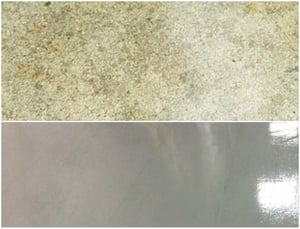 Concrete is a remarkably durable building material, but it’s not damage-proof. Not only is it subject to cracking as it cures, untreated concrete can be affected by vehicle traffic, corrosive chemicals, and freezing water.
Concrete is a remarkably durable building material, but it’s not damage-proof. Not only is it subject to cracking as it cures, untreated concrete can be affected by vehicle traffic, corrosive chemicals, and freezing water.
If you have a concrete surface, whether exterior or interior, there’s a good chance you’ll need to get it treated with some sort of sealant or coating. But which is best for your situation—a concrete sealer, or something stronger such as an epoxy or urethane?
The answer depends mostly on where the concrete is located and what it’s primarily used for.
Concrete floor sealer
A lightweight concrete sealer is ideal for outdoor surfaces that are subject to damage from the elements—particularly from freezing and thawing temperatures that can break concrete surfaces up over time.
When we talk about sealers, we’re referring to either an acrylic-resin sealer, or a penetrative sealer such as a silane or siliconate. (Technically an epoxy or urethane coater can be considered a type of sealer, but these also add a number of other properties to the floor and so will be considered separately.)
You can find a variety of modern sealers on the market with different chemical properties, so the list of advantages below is a generalization. Check the label for the specific product you choose for full information.
Advantages of concrete sealers:
- Seals the surface pores of the concrete to make it impervious to liquid
- Protects from freeze/thaw cycle cracking
- Prevents surface from stains due to oil drips, dirt, mold, etc.
- Protects from minor corrosion from chemicals and salt
- May make the surface look wet or shiny, depending on the formula used
- Generally inexpensive to purchase
Installation considerations:
- Relatively simple to apply as a DIY project
- Lasts for up to 5 years before needing re-application
Best applications:
- Driveways, patios and other outdoor surfaces
- Small home projects such as basements
- Indoor surfaces that don’t have a lot of foot traffic
Epoxy or urethane coatings
Epoxy floor coatings are chemically different than urethane coatings, but they are often used in tandem on concrete floors. So we’ll be looking at the general benefits that these share, either when used separately or together.
Epoxy and urethane coatings tend to be more expensive than a simple concrete sealer, but they offer better protection.
Advantages of epoxy/urethane coatings
- Seals the surface pores of the concrete to make it impervious to liquid
- Protects from damage from water and oil stains
- Can prevent corrosion due to industrial chemicals
- Protects surface from abrasions and impact damage
- Comes in a variety of colors and patterns that can be customized
Installation considerations:
- Because of the risk of bubbles and other bonding failures, it’s best to hire a professional contractor
- May last between 5 to 10 years (or even longer) before needing reapplication
Best applications:
- Industrial facilities such as factories, warehouses, etc.
- Retail facilities with high levels of foot traffic
- Commercial and residential garages
- Concrete floors with inherent moisture issues
- Indoor applications (epoxy can be sensitive to UV light and may discolor if not properly prepared)
Which one is for you?
If you’re looking to give an outdoor patio or driveway some basic protection, or you have an interior space that doesn’t have to withstand a lot of abuse, a simple concrete sealer may be all that you need.
On the other hand, if you need to provide serious protection for an industrial or commercial floor that is regularly exposed to chemicals, heavy traffic, or other potential causes of damage, you’ll be better off with an epoxy or urethane.
Want to get a second opinion? If you’re in the Southeastern US, an expert from CPC Floor Coatings can help you determine what is best for your situation. Call us at (864) 855-0600, or contact us online for a free consultation.

